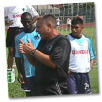Evaluating Training Programs
I have received several emails asking to comment on various training programs. I always find this difficult. Often when you see a program posted on the internet in these various discussion groups or published in a journal the workouts are taken out of context. By that I mean you cannot see the phase that preceded the workouts, and often it is not very clear where the workouts are leading. Also important is what population, in terms of developmental age, is the workout aimed at.
Much of the recent discussion on sprint mechanics is a good example of another problem, that is taking someone else’s ideas or research and putting your on twist on it. To combat this I always try to go straight to the source, personally if possible. Frankly that is what I found discouraging about the argument. I visited with Bosch and Klomp, I visited Peter Weyand. I was involved in Ralph Mann’s original research. All of them have been misinterpreted. Read the research and stop and analyze it logically. I still have not met a scientist who innovated a training concept. They follow coaches and verify or refute.
I think it is important to understand that there are no MAGIC training programs. Many times people succeed in spite of, not because of what they do. I also know that there is often a big difference between what athletes or coaches say they do in training and what they actually do. I have observed that phenomenon first hand many times. Once again use common sense, and think about what they are saying.Beware of the monkeysee, monkey do syndrome.
Remember another key point. Training is more that getting tired. Anyone can design a workout that will kick an athletes butt or devise an exercise that really burns, but where does that fit. Keep the big picture in mind. Who are you working with? What is their training age? What is their lifestyle? Are they fulltime students or professional athletes? It is more than a training method or a training program it is a total commitment to personal excellence. To be an effective coach is not about searching for secrets, because there are none, it is about keeping an open mind, continual learning and innovation. Follow the Functional Path!


0 Comments:
Post a Comment
<< Home